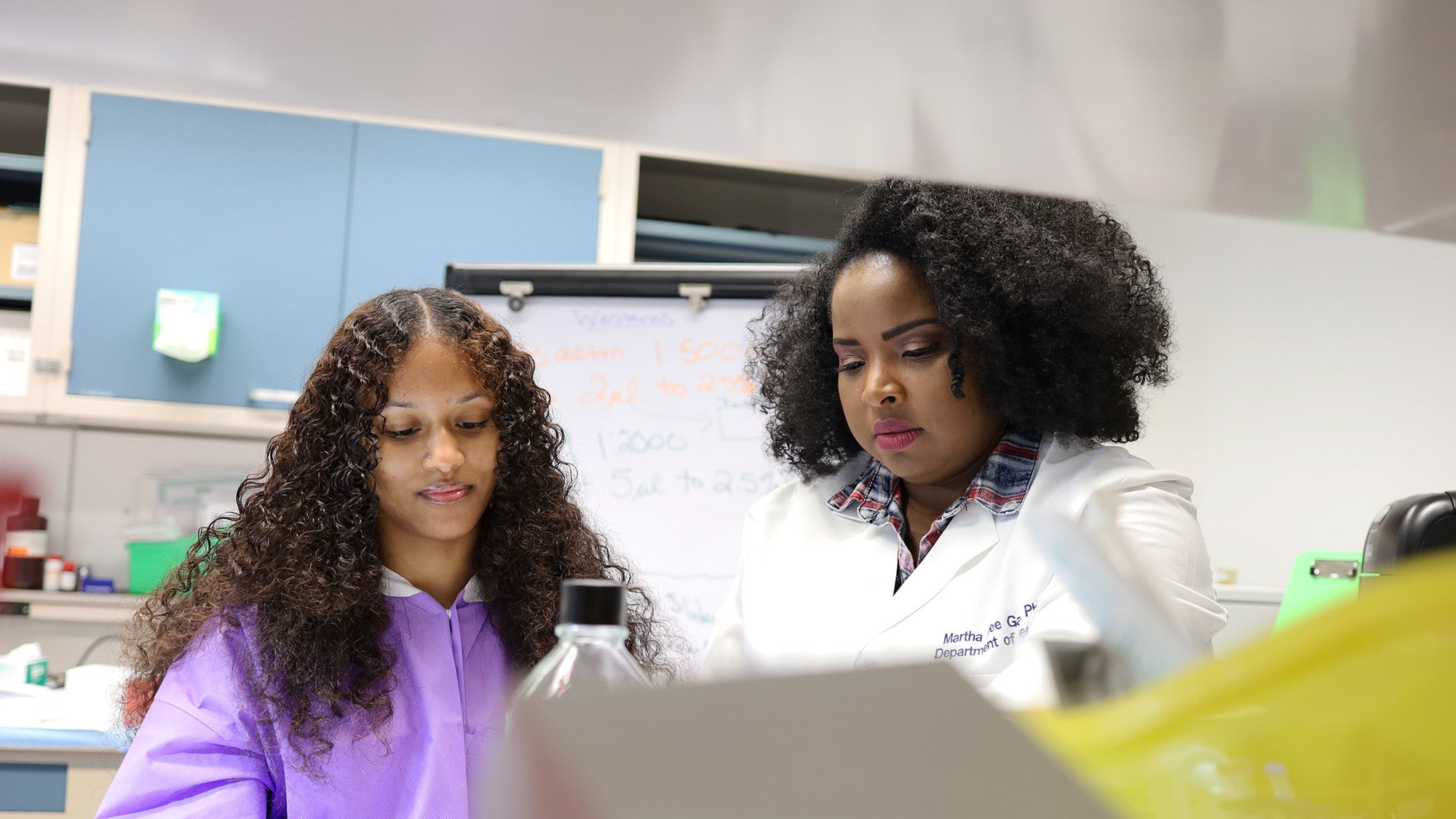For First-Generation Students, Path to Medical School Runs Through Georgetown
(August 20, 2025) — On a humid July afternoon in Washington, D.C., 22 students — 10 undergraduates and 12 high schoolers — gathered in an auditorium at Georgetown University Medical Center to practice their oral presentations on health disparities. They were participants in two six-week School of Medicine pathways programs organized through the Office of Diversity, Equity, Inclusion & Belonging and designed to inspire students from diverse backgrounds, many of them future first-generation medical students, to explore careers in health care.
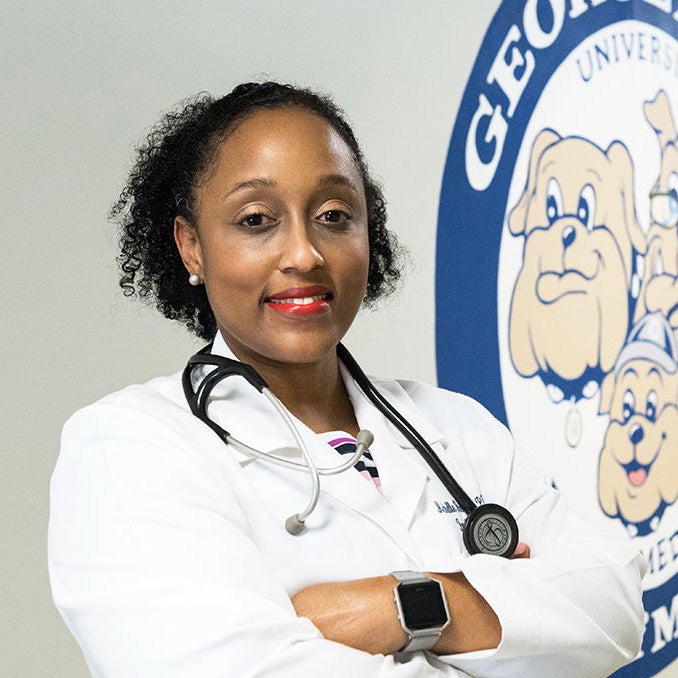
Michelle Roett, MD
“At the School of Medicine, we are committed to doing the work of creating a pathway where people from diverse backgrounds have the opportunity to see a doctor with a similar background to theirs, because we know when this happens, it leads to better health outcomes,” said Michelle Roett, MD, chair and professor of family medicine and the founding director of the Georgetown University Center for Health Equity. “So much of what we are trying to accomplish in these programs is mentoring, finding that person who can help you navigate the path to your future goals.”
“We know that talent is equally distributed across all communities, but opportunity is not,” said Khaseem Davis, PhD, senior associate dean for diversity, equity, inclusion and belonging at the School of Medicine. “Our programs open doors that might otherwise remain closed, offering students access to careers in medicine and health that can transform their futures.”
A New Mentor, a New Career Possibility
Undergraduate students from institutions across the country participated in the Academy for Research, Clinical, and Health Equity Scholarship (ARCHES) program at Georgetown. As fellows, ARCHES students go on clinical rounds with physicians at MedStar Georgetown University Hospital, participate in immersive research in Georgetown labs, and complete capstone research projects on a health equity challenge.
“One focus of ARCHES is having students think about serving underserved communities in their careers, especially by providing primary care,” said Roett.
This year’s cohort included students attending Xavier University, New York University, Washington University in St. Louis, and The Ohio State University. During their time at Georgetown, ARCHES fellows shadowed at a MedStar Health primary care clinic, a federally qualified health center, and at Street Health DC, a mobile clinic that provides health care for unsheltered people in Washington, D.C.
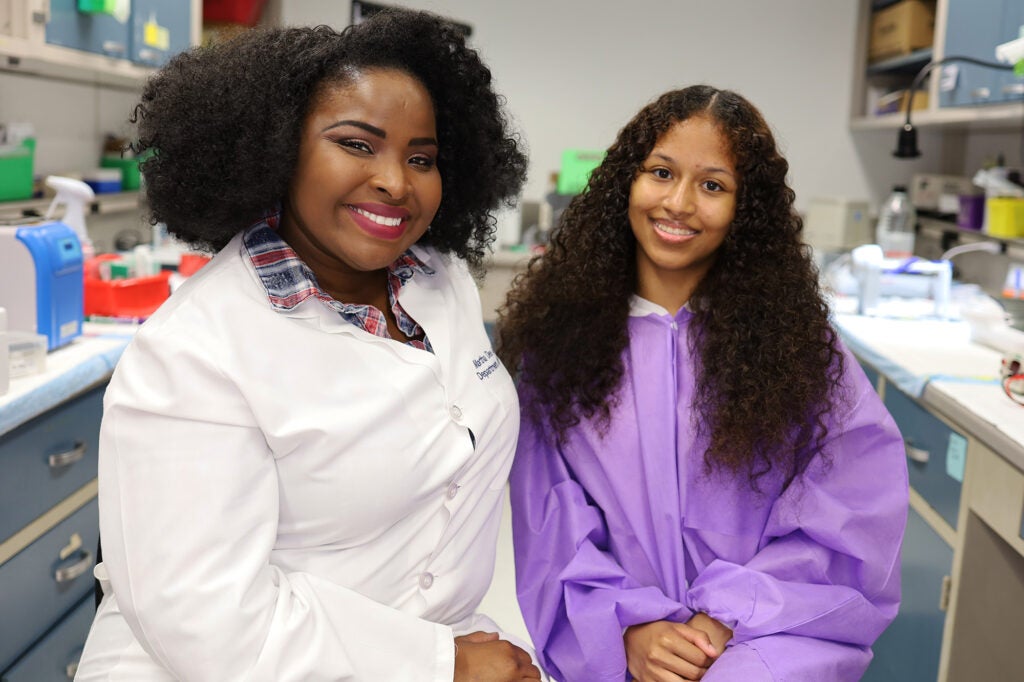
(From r) ARCHES student Taleyah Evans, a junior at Xavier University in New Orleans, Louisiana, worked alongside Martha Gay, PhD, assistant professor in the Department of Medicine.
Some ARCHES fellows performed bench research, like Taleyah Evans, a junior at Xavier University in New Orleans, Louisiana. She spent her time working alongside Martha Gay, PhD, assistant professor in the Department of Medicine, who studies the role of dietary fat in gastrointestinal cancers.
“I worked with my ARCHES fellow in a hands-on manner doing basic science,” said Gay. “We start off the first few weeks understanding cell cultures and getting an introduction into how to work with mice, since my work involves feeding mice a high-fat diet and tracking their weight.”
After laying the groundwork, Gay expands beyond animal models and cell cultures to teaching Evans about protein expressions and encouraging her to participate in research projects. Evans was in the lab with Gay three days a week, but also participated in other ARCHES experiences, such as shadowing a nurse at the Washington, D.C., emergency housing shelter.
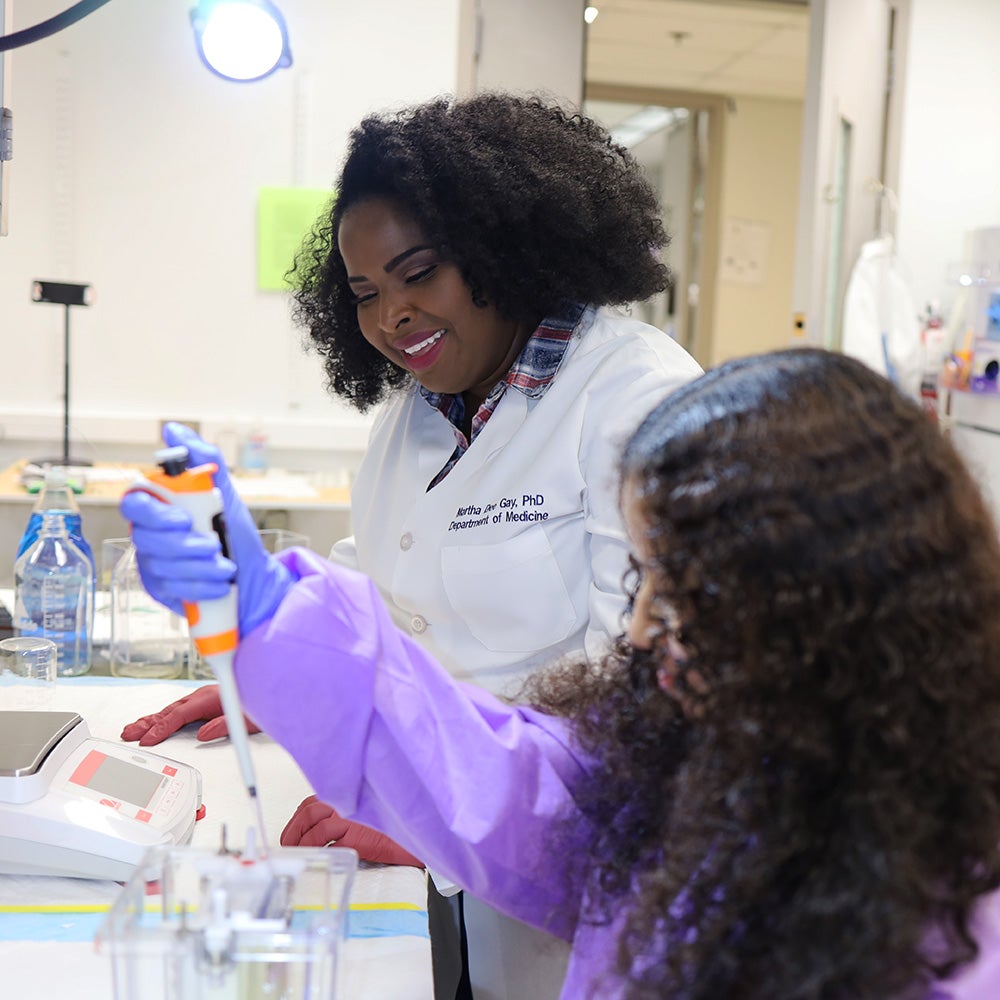
As an ARCHES fellow, Evans received hands-on work experience as well as mentoring.
“In addition to exploring different health career paths, we are also helping students build a portfolio to apply to medical school, including research projects and clinical exposure, which can be quite difficult to access for students who don’t have a connection like a family member in medicine,” said Roett. ARCHES fellows are also offered the opportunity to speak with the School of Medicine’s admissions team to hear what they are looking for in medical school applicants.
“The shadowing experiences in seeing how different demographics deal with health and the community outreach that takes place to reach people is really impactful,” said Evans. “I grew up in D.C. and heard about Georgetown going out in the D.C. community, and this has shown me that the School of Medicine invests in what they stand for.”
Evans, who had an interest in medicine before ARCHES, is now open to the world of research as a career as well. “I had never thought about looking at something specific, like a liver injury, and doing the kind of research Dr. Gay does, but I’m really enjoying it and learning about what you are able to do in a lab,” she said.
Cultivating Younger Minds
The high school students in the auditorium were part of the Gateway Exploration Program (GEP), an internship for local students interested in careers in health. This year’s cohort of GEP scholars included students from Calvin Coolidge High School and Jackson-Reed High School who are interested in researching why there is a higher maternal mortality rate for Black women in Washington, D.C., along with why Wards 7 and 8 have higher rates of diabetes and food insecurity than their neighbors.
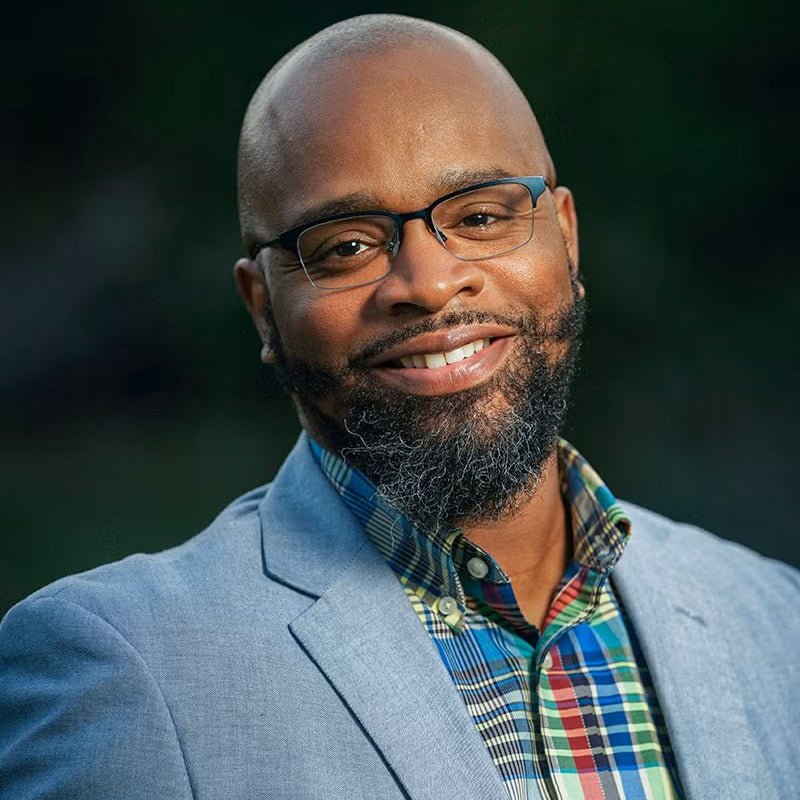
“The GEP and ARCHES are living testaments to our unwavering commitment to community,” said Khaseem Davis, PhD.
“The GEP and ARCHES are living testaments to our unwavering commitment to community,” said Davis. “Our students are not just bright — they are visionaries, passionate about advancing health equity and determined to be catalysts for change in both communities and the field of medicine at large.”
Before presenting their capstone research projects, GEP scholars interned with medical departments and participated in professional development and mentoring workshops with medical students as well as brown bag presentations focused on health disparities.
“The GEP does a wonderful job of exposing high school students interested in a career in medicine to be able to see themselves in medical school and tell themselves, ‘This could be you,’” said Roett.
Building a Bigger Base
Evans and Gay both expressed appreciation for the focus on developing career paths for students from diverse backgrounds. “I really appreciate the emphasis on diversity with ARCHES,” said Evans. “I’m able to see myself in these research opportunities and in medical school, and I’m surrounded by a cohort of people like me who have the same plans, and it just helps us develop a bond so quickly.”
In addition to their time in the clinic or in the lab, ARCHES fellows attended lunches with medical student mentors, information sessions on financing medical school, and a panel with ARCHES alumni who have gone on to establish health careers. ARCHES fellows presented their capstone research projects ahead of a closing ceremony for the program on July 25. For her health equity capstone project, Evans focused on the high rates of hypertension in low income communities in New Orleans. She also completed a capstone project related to her lab work involving the liver, looking at how proglumide and topiramate effects late-stage hepatic cell lines.
“At Georgetown, we are a teaching institution. We believe in educating and expanding the base of people able to access careers in health,” said Gay. “These programs can change the trajectory of a student, to have a mentor like me who’s a Black woman and a Black scientist, to see a career path for themselves.”
To further aid their journeys after ARCHES and GEP, program leaders encourage students to stay in touch with their mentors and fellow cohort members. If more resources become available, program leaders would like to create a program to help ARCHES students prepare for the MCAT and GEP students prepare for the SAT.
“We are only making a tiny, but important, impact with 10 ARCHES and 12 GEP students,” said Roett. “Imagine the kind of impact we could make with more resources, more staffing to expand the opportunity of choosing medicine as a career.”
Heather Wilpone-Welborn
GUMC Communications
